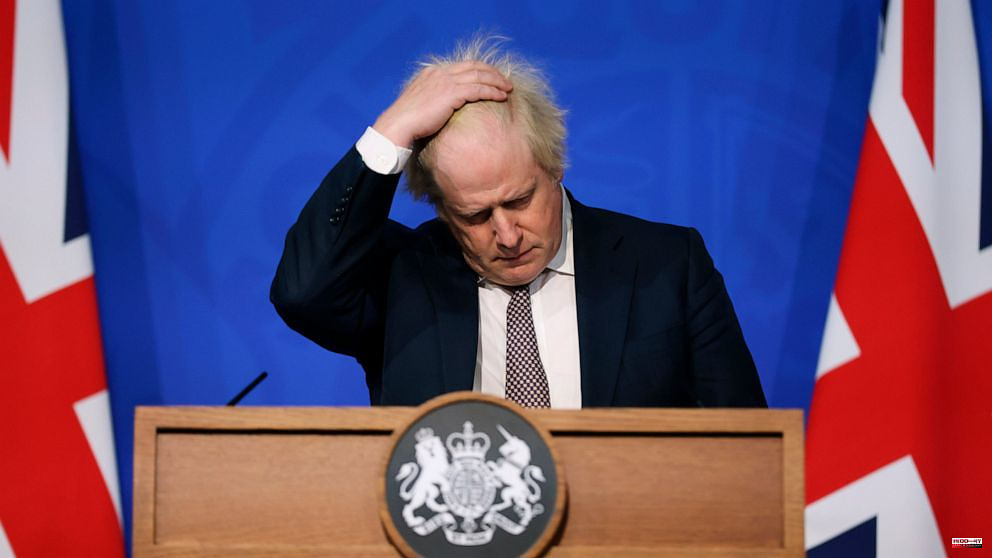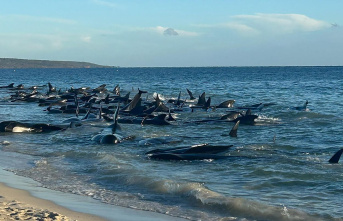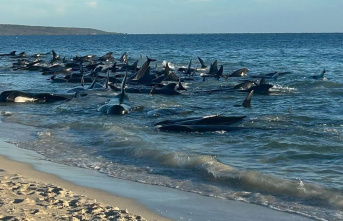LONDON -- He was London's mayor, who revelled in hosting the 2012 London Olympics. And he was also the man who led Conservatives to a crushing election victory thanks to his pledge to "get Brexit done."
Boris Johnson's tenure as prime minister was marred by the handling of the coronavirus epidemic and a steady stream ethics allegations. These ranged from how he handled an alcohol-fueled government party that violated lockdown rules to his handling of a sexual misconduct case involving a senior lawmaker.
Here's a timeline that relates to Johnson's political career.
2001-2008: Serving as a member of the House of Commons for the constituency of Henley.
2008-2016: London mayor. Oversees the 2012 London Olympics.
2016: In opposition to David Cameron (a Conservative), co-leader of the campaign for Britain to be taken out of the European Union. Cameron resigns following the approval of Brexit by voters in a referendum held on June 23, 2016.
2016-2018: Acts as Foreign Secretary for Cameron's successor, Prime Minster Theresa May. Johnson resigns July 2018, in protest to May's strategy of a soft Brexit that would keep close ties with Europe.
June 7, 2019, Theresa May, Conservative Party leader, resigns after she failed to convince Parliament to support the Brexit deal she negotiated with EU. The party is divided between those who support May and hard-liners led by Johnson who are willing to take on a no-deal exit to secure concessions from EU.
July 23, 2019, Johnson is elected Conservative Party leader by members in a party vote. The next day Johnson is elected prime minister. He inherits a minority government that depends on the votes of Northern Ireland's Democratic Unionist Party for legislation to be passed. Johnson insists that Britain will leave the EU on October 31, whether or not there is a deal.
August 28, 2019, Johnson: Johnson announces that he will close Parliament from mid-October to give opponents less time for a no-deal Brexit.
September 3, 2019, 23 rebel Conservative Party lawmakers back legislation that requires the government to extend Brexit negotiations if it cannot reach an agreement with EU. The measure is passed and the rebels are expelled.
September 5, 2019, Johnson: Johnson says he'd rather die in a ditch than ask for an extension from the EU.
September 24, 2019, U.K. Supreme Court declares that the government's suspension o Parliament was illegal.
Oct. 19, 2019, Johnson requests that the EU delay Brexit once more. Jan. 31 is the new deadline
Nov. 6, 2019, Parliament dissolves and early elections are scheduled for mid-December. Johnson is seeking a mandate to implement his Brexit strategy.
Dec. 12, 2019, Johnson wins an 80-seat majority at the general election. This gives him the support he needs to pass Brexit legislation. Johnson is now the most successful Conservative leader since Margaret Thatcher.
Jan. 23, 2020: After approval by the U.K. Parliament, the Brexit deal becomes law. Six days later, the European Parliament approves of the agreement.
March 23, 2020: Johnson locks down the United Kingdom due to COVID-19.
April 5, 2020: Johnson was admitted to the hospital and then transferred to intensive care with COVID-19. Johnson is discharged from the hospital on April 12 after expressing gratitude to the nurses for their support throughout the night.
Nov. 3-4 2021: Johnson's government orders Conservative legislators to support a modification in ethics rules to delay suspension of Owen Paterson (a Johnson supporter who was censured for violating lobbying rules). The measure is passed. Johnson reverses course a day later and allows legislators to vote on Paterson’s suspension. Paterson resigns.
Nov. 30, 2021 - There are allegations that officials from the government attended parties at government offices in November and December 2020, in violation COVID-19 lockdown rules. There are now reports that the scandal involves more than a dozen parties. Johnson denied the allegations. Opposition leaders criticize Johnson for violating the law while people made sacrifices to fight the pandemic.
Dec. 8, 2021: Johnson authorizes an investigation into the scandal, "Partygate". Pressure builds up for a leadership challenge but fails to materialize.
February 3, 2003: Johnson's long-serving aide Munira Mirza quits Downing Street. She is followed by three other top aides.
March 23, 2009: The government announces its mid-year spending plan. It's criticised for not doing enough to help those struggling with rising living costs. Rishi Sunak, Treasury chief refuses to delay an income tax hike or impose windfall profits taxes on oil and gas companies that are benefited from rising energy prices.
April 9, 2015: Johnson meets Volodymyr Zelenskyy, the Ukrainian President. They pledge a new package for military and economic support. Johnson and his supporters are encouraged by the move, as they argue that the government should not be focusing on domestic political disputes.
April 12, 2012: Johnson is penalized 50 Pounds ($63) for participating in one of the lockdown parties. Opposition parties describe him as the first U.K. prime Minister to be found breaking the law while in office. Johnson apologizes, but insists that he did not know he was violating the rules.
May 22: The "Partygate", investigation's findings are published. They detail 16 gatherings that took place at Johnson’s house and office, as well as other government offices, between May 2020 to April 2021. The report details Johnson's staff's excessive drinking at a time in which millions were unable see their loved ones and friends.
May 26, 2012: The government reverses its tax decision regarding oil and gas companies, and announces plans to levy a 25% windfall profit levy.
June 6th: Johnson narrowly wins the vote of no confidence. Conservative lawmakers voted 211 to 148 in his favor. However, the magnitude of the revolt -- 41% of those voting against him -- shakes Johnson's grip on power.
June 15, 2008: Christopher Geidt, Johnson's ethics advisor, resigns. He accuses the Conservative government with planning to violate conduct rules.
June 24, Johnson's Conservatives lose 2 former strongholds in special elections to the opposition parties
June 29, 2009: The Parliament's Cross-Party Privileges committee issues a request for evidence to investigate whether Johnson misled Parliament about lockdown parties.
June 30, 2012: Chris Pincher, Conservative deputy chief whip, resigns amid allegations that he assaulted 2 guests at a London private members' club. Pincher has been accused of sexual misconduct in the past. There are questions about Johnson's knowledge of the allegations when Pincher was appointed to the job.
July 5, 2015: Johnson apologizes to Pincher for his handling and claims he forgot he was told about the allegations. Johnson fired two of his most senior Cabinet ministers, Treasury chief Rishi Javid and Health Secretary Sajid Javid.
July 6, 2012: Johnson is attacked by three dozen junior ministers who resign from Johnson's government.
July 7, 2011: Johnson resigns from his position as leader of the Conservative Party, but he plans to continue as prime minister during the contest for the leadership.
------
Follow all of AP's coverage of Boris Johnson at https://apnews.com/hub/boris-johnson












